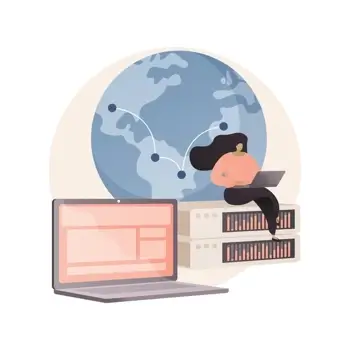What Is a Web Proxy?
Privacy is difficult to find online. Web proxies and web proxy servers help combat this widespread lack of anonymity by providing users a way to hide their IP address online. Read to understand what a web proxy is and how it can benefit you.
What is a web proxy server?
A web proxy server acts as a gateway between you and the rest of the web. It provides a quick and easy way to change your IP address while surfing the Internet. Instead of showing your IP address, the proxy server’s IP address is shown to the destination, thus disguising your own IP and providing anonymity to the user. If you want to keep your IP address private, proxies are a great choice; you get the same Internet access and website results, but with an anonymous web proxy, web browsers and sites won't be able to tell where your address is coming from.
Web proxies are extremely portable as they do not require the installation of additional software. They also do not require modification to computer networking settings. They are used like a search engine in your web browser, except that you enter a website address instead of a search query into a form, and web proxies return web pages rather than search results. The sites you visit through the proxy see an IP address belonging to the proxy rather than your IP address.

These proxies vary a great deal in features and functionality. The best ones offer SSL security, which encrypts communications between the user and the servers themselves. A beneficial side effect of SSL is the ability to bypass censorship restrictions in countries which restrict access to websites. Web proxies also afford some additional options, including User Agent masking, cookie management, and advertisement removal.
Types of web proxy
There are two general types of proxies - open and closed. Aside from that, there are three levels of proxy: high anonymity proxy, distorting proxy, and transparent proxy. All are anonymous in the sense that websites and web browsers you visit won't be able to see your real IP address, but the levels determine whether or not the proxy server itself will be able to see your IP.
Transparent doesn't hide your IP address from a server, but it works well to increase network speeds. Distorting, the second level, does hide your IP address from target servers, but some still may be able to detect that you're using a proxy and thus changing your IP address. High anonymity is the most powerful and the most private; these proxies hide your IP address as well as the fact that you're using a proxy at all, providing total anonymity.
Consider what you want to use the proxy for and that can help you determine which one is right for you. You can also weigh the differences between web proxy servers and VPN services if you want a level of anonymity without using a proxy; VPN services are another great way to browse the Internet with increased privacy.
Uses of web proxies
Web proxies first and foremost are a good way to allow users to browse online with increased privacy. As the proxy changes your IP address during browsing sessions, it keeps your identifying data private so servers don’t know that your device is the one making the request.
Besides the obvious appeal of being hidden with an anonymous proxy, there are other reasons to consider using a proxy service. It improves security, for one; it protects against malware and other malicious software, which can in turn protect you from crimes like identity theft or information theft.
They're also helpful in balancing Internet traffic overall, lessening the number of crashes experienced during a user's browsing session.
Many schools and businesses use web proxies to allow users on the other end to control the websites that students or staff can access in the office. They also save bandwidth, compressing general traffic to speed up Internet service.
Is a web proxy safe?
The safety of a web proxy depends on the kind that you use. In general, paid proxy services are safe to use, whether they’re standard proxies or web proxies. These proxy services are authenticated, meaning they have shown their services to reliably handle and secure user data.
However, free web proxy servers are significantly less safe. Because they’re free, they can rely on their alluring price tag to gain users rather than the quality of their services. These proxies often monitor connections and present a greater risk of malware than paid proxy services.
Ultimately, if you choose to use one of these proxies, using a paid service is the safest option.
Proxy recommendations
Given the different types of proxy servers available, choosing the right one can be confusing. We recommend Proxify, the leading proxy service. Proxify is most popular and longest running web-based proxy on the Internet. The server commits to the privacy and security of its users. It also has many locations around the world, which enables you to appear as if you are connecting from other countries.
If you'd rather use a free web proxy, there are free proxy sites like Hidester that serve similar functions. Proxysite is great for browsing social media sites, like Facebook. Whether you choose a free web proxy or a paid proxy plan, you'll be able to browse the internet with greater anonymity and keep your personal information more secure. However, paid proxy plans are recommended for security and safety reasons.